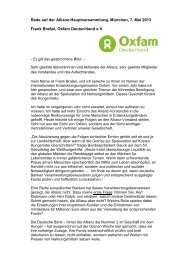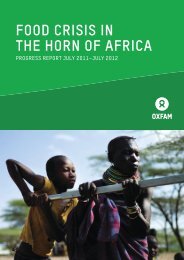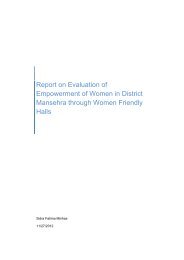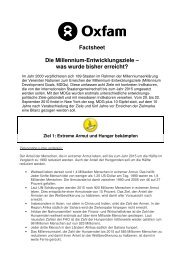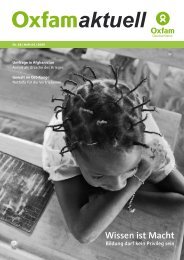shape - Oxfam
shape - Oxfam
shape - Oxfam
Create successful ePaper yourself
Turn your PDF publications into a flip-book with our unique Google optimized e-Paper software.
TO START OFF I HAVE LEARNT TO BE AN<br />
ASSERTIVE PERSON DESPITE THE CONSEQUENCES<br />
I HAVE TO FACE. I NOW KNOW HOW TO STAND UP<br />
FOR MY RIGHTS NOT ONLY AS A HUMAN BEING<br />
BUT AS A WOMAN. IN THIS ERA WHERE THE<br />
STRUGGLE FOR GENDER EQUITY AND EQUALITY<br />
IS RIFE, I HAVE MYSELF AS ONE SUCH WARRIOR<br />
IN THE FIGHT TO REPOSITION WOMEN ON THEIR<br />
RIGHTFUL THRONE AS LEADERS IN THE HOME,<br />
AT WORK AND IN ALL SPHERES OF LIFE.<br />
IN PROFILE<br />
Grace R Chirange, Culture<br />
Society President<br />
Grace Chirange, 23,<br />
is from Harare. She is<br />
completing a Bachelor of<br />
Arts Honours in African<br />
Languages and Culture<br />
and is in her fourth year.<br />
SANDRA, FIRST-YEAR STUDENT.<br />
2. Grooming strong,<br />
assertive women – gender<br />
training for female students.<br />
While male students undergo<br />
masculinities training, female<br />
students take part in assertiveness<br />
training that focuses on gender<br />
roles and their link to women’s<br />
increased vulnerability to HIV<br />
infection. Workshops are held<br />
over two-days and are facilitated<br />
by a female trainer.<br />
During the training, female<br />
students discuss and challenge<br />
female stereotypes and ideologies<br />
such as being subservient to<br />
men, being confined to the kitchen<br />
and being unable to say “no”<br />
to sex or to ask men to use<br />
condoms. Participatory exercises<br />
are used to make young women<br />
question the various messages<br />
they receive about being a “good”<br />
or “proper” woman. Often women<br />
have internalised their subordinate<br />
status to such an extent that they<br />
firmly believe it is natural and<br />
due to the biological differences<br />
between men and women.<br />
These exercises help them<br />
understand the social basis of<br />
gender inequalities and realise<br />
that these can change. The first<br />
group of female students to<br />
complete the assertiveness<br />
training in 2004 developed the<br />
slogan “Strong, Assertive Women”<br />
to capture the essence of the<br />
workshops. The slogan has stuck<br />
ever since. Female students<br />
proudly wear t-shirts bearing the<br />
slogan at all SHAPE functions and<br />
this has proved to be an effective<br />
educational tool. The t-shirts attract<br />
attention from both female and<br />
male students and provide an<br />
easy entry point for peer education<br />
around gender and HIV issues.<br />
The assertiveness training is<br />
helping to change the culture<br />
at MSU and increase women’s<br />
confidence to participate in<br />
university activities. Several<br />
women who have completed<br />
the training now hold leadership<br />
positions on campus, including<br />
the Student Representative<br />
Council; they are taking part<br />
in previously men-dominated<br />
sports such as volleyball,<br />
soccer and chess, participating<br />
in academic discussions,<br />
organising SHAPE events<br />
and facilitating dialogue<br />
around condom use, HIV<br />
and gender issues. Female<br />
students are also now standing<br />
up for their rights on campus.<br />
They have begun a strong<br />
campaign against sexual<br />
harassment and sexual abuse<br />
both on campus and in the wider<br />
community through their pressure<br />
group Fire and Ice.<br />
This increase in self-esteem,<br />
confidence and assertiveness<br />
creates the space for female<br />
students to negotiate mutually<br />
beneficial relationships with<br />
male students and not succumb<br />
to peer pressure.<br />
TOP: First-year finance student Catherine<br />
and second-year media studies student<br />
Melissa do their homework in their room in<br />
the female hall of residence at MSU. Photo:<br />
William Nyamuchengwa/<strong>Oxfam</strong>AUS.<br />
OPPOSITE PAGE: Photo: William<br />
Nyamuchengwa/<strong>Oxfam</strong>AUS.<br />
Grace joined SHAPE soon after it<br />
was established at MSU in 2004<br />
and is currently a peer educator<br />
and President of MSU’s Culture<br />
Society. In 2006 she helped<br />
organise a Culture Celebration<br />
Day at MSU that explored HIV<br />
and AIDS, gender and culture.<br />
“I became very actively involved<br />
in SHAPE early this year because<br />
I became the President of the<br />
Culture Society and... we worked<br />
in collaboration with SHAPE<br />
Zimbabwe in order to raise<br />
awareness about gender, HIV<br />
and AIDS and culture.”<br />
“Before I came to MSU, I noticed<br />
that in my background, women<br />
are marginalised. My mother<br />
didn’t get to have the same<br />
education that I did, whilst her<br />
brothers were taken to school.<br />
And you find that many women in<br />
the community at large were not<br />
offered the same opportunities as<br />
their male counterparts. So I<br />
found it rather interesting –<br />
why does our culture do that?<br />
Is it because they lose us<br />
(women) in the process when<br />
we get married?<br />
“SHAPE is helping us as peers<br />
to interact at a deeper level.<br />
Before SHAPE there was less<br />
student-to-student interaction.<br />
Now, I find I can go to the next<br />
guy and approach and tell him<br />
‘risky behaviour is not good’,<br />
because already there is that<br />
platform that we have gained<br />
from SHAPE Zimbabwe.<br />
“Actually, just the day before<br />
yesterday, two guys came to me<br />
and were asking about sex and<br />
they were roughly between 19<br />
and 21. And they were talking<br />
about sex, the myths involved,<br />
what are the truths and things<br />
like that. I think if you find a<br />
discussion between a male and<br />
a female so openly, that’s good<br />
because they get to understand<br />
how the females feel and we get<br />
to understand how they feel and<br />
we can help each other work<br />
towards positive behaviour in<br />
terms of HIV and AIDS. Also, it<br />
breaks [down] that cultural barrier<br />
whereby it is taboo in African<br />
culture to talk about sex,<br />
condoms with males; but now<br />
we can. It is helping us to just<br />
develop as a student body.<br />
“This year we managed to hold<br />
a Culture Celebration Day and<br />
we were able to talk about<br />
gender, HIV and AIDS and<br />
culture. We also took it provincewide.<br />
We took it to the city of<br />
Gweru and then we had a sort<br />
of roadshow…we are also<br />
planning on taking this<br />
nationwide, whereby we are<br />
going from province to province<br />
and highlighting the issues of<br />
HIV and AIDS, gender awareness<br />
and maybe culture and how it<br />
affects the community.<br />
“It’s our hope that by using<br />
culture, culturally-based gala<br />
shows and things like that, we will<br />
be able to capture the general<br />
public, not just the elites of<br />
society, but the general person<br />
that is affected by HIV and AIDS.<br />
“SHAPE has really touched this<br />
community…relationships are<br />
being built and conflict resolution<br />
has improved because people…<br />
are able to talk and help other<br />
students solve their personal<br />
problems. You notice that even<br />
the risky behaviour has changed.<br />
People now are so open about<br />
condoms. It’s not a rare thing to<br />
hear someone say ‘where are the<br />
condoms?’ Also SHAPE works<br />
with the Christian groups and<br />
that’s good because people get<br />
to also lean on the Christian<br />
spiritual beliefs so as to stop the<br />
bad behaviour.”<br />
16 17


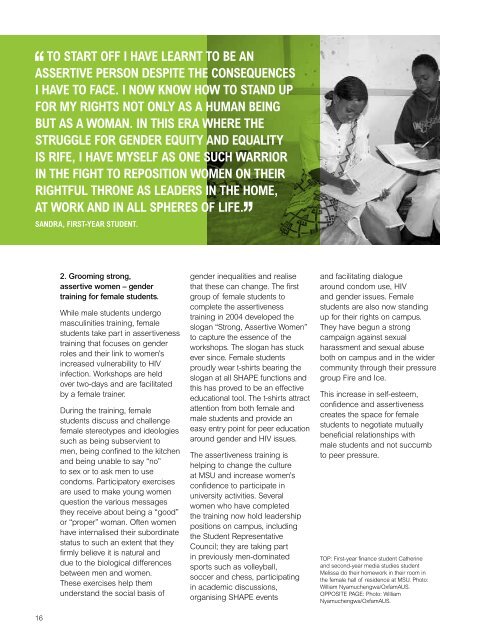

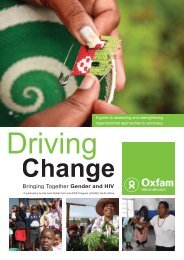

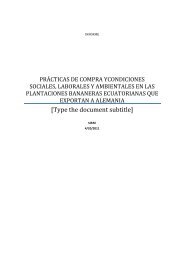
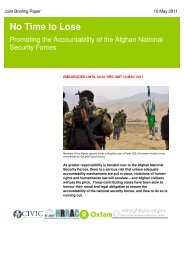
![Download: Faltposter EU-Handelspolitik [PDF 2,17MB] - Germanwatch](https://img.yumpu.com/25095854/1/190x161/download-faltposter-eu-handelspolitik-pdf-217mb-germanwatch.jpg?quality=85)
